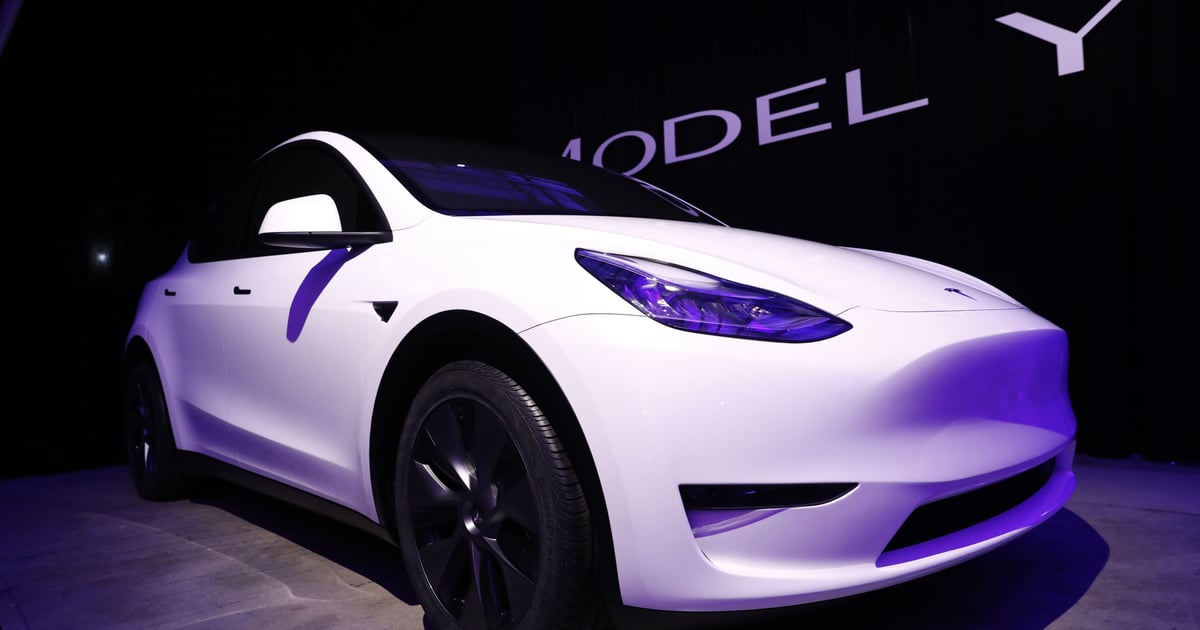
Tesla Inc.’s price cuts in the first quarter led to significant volume gains, according to U.S. new-vehicle registration data from Experian. But the benefits came mostly from the relatively fresh Model Y crossover and not the older Model 3 sedan, Model X crossover or Model S hatchback.
Analysts are closely watching Tesla’s numbers after CEO Elon Musk said last month he was willing to sacrifice profits to maintain a global growth target of 50 percent a year for the foreseeable future. Tesla is targeting between 1.8 million and 2 million vehicles in total global production this year.
After deep price cuts in January and several adjustments after that, Musk said, “the overall thing we can say is that orders are in excess of production.”
Tesla opened two new factories last year, in Texas and Germany, boosting Model Y annual capacity by about half a million vehicles, the company said.
In the first quarter, Tesla’s U.S. registrations rose 37 percent compared with the same period last year to 155,360 vehicles, Experian data shows. Registrations for the Model Y soared by 79 percent to 93,294 vehicles, representing more than one-third of all EV sales in those three months.
Because Tesla doesn’t break out U.S. sales from global numbers, registrations serve as a proxy.
Tesla reduced the Model Y starting price from $67,440 with shipping at the beginning of the year to $56,630 by the end of the first quarter. The automaker reported a 24 percent drop in net income due to global price reductions and other factors, it said.
In the U.S., the Model Y became eligible for a new federal tax credit of up to $7,500 as of Jan. 1, providing a further incentive to buyers. A year earlier, Tesla buyers were not eligible for a federal tax break because, under the old rules, the automaker had reached its quota for the credits.
The Model Y went on sale in 2020. It shares a platform with the Model 3, which launched in 2017. The Model S and X are built on an older platform. Tesla’s next model, the Cybertruck pickup, is expected to go on sale in limited numbers this year.
First-quarter registrations for the Model 3, Tesla’s least expensive model, rose 11 percent to 52,885 vehicles, Experian said. The base Model 3 saw a price reduction from $48,440 with shipping to $44,630, according to Tesla’s order page. The base Model 3 qualifies for a $3,750 tax incentive.
Tesla’s flagship vehicles, the Model S and Model X, posted mixed first-quarter numbers. Registrations for the Model S fell 71 percent to 2,636 vehicles, while the Model X rose 34 percent to 6,545 vehicles compared with a year earlier.
In its first-quarter earnings report, Tesla suggested that Model S deliveries fell in part because vehicles were in transit from its California factory to global markets.
The automaker cut the price of the Model S from $106,440 with shipping to $91,630 over the course of the first quarter, while the Model X fell from $122,440 at the beginning of the year to $101,630 by the end of March. Both are too expensive to qualify for federal EV tax incentives.
Tesla’s share of U.S. electric vehicle registrations was 60 percent in the first quarter of the year, according to Experian. That’s down from 72 percent in first-quarter 2022.
The automaker’s dominance has been eroded by EVs from legacy brands and startups, such as Rivian Automotive, analysts said. Tesla’s top EV rivals this year are Chevrolet, Ford, Volkswagen, Hyundai and Mercedes-Benz. But competitors still face supply constraints for their new EV models.
EV registrations overall represented 7 percent of the U.S. light-vehicle market in the first quarter, according to Experian, a significant rise from a 4.6 percent share a year earlier.
In raw numbers, EV registrations reached 257,507 vehicles in the first quarter, out of total light-vehicle registrations of 3,693,161, Experian said.
While Tesla’s year-on-year gains were significant in the first quarter, the numbers were less impressive compared with the fourth quarter of last year.
Tesla’s quarter-on-quarter registrations rose 13 percent, according to Experian data, from 137,553 vehicles to 155,360. The gains were led by the Model Y, with a 30 percent increase from fourth-quarter 2022 to first-quarter 2023. Model 3 registrations rose by less than 1 percent from 52,436 vehicles to 52,885.
Registrations of the Model X fell from 9,643 vehicles in the fourth quarter to 6,545 in the first quarter, while Model S registrations dropped from 3,603 vehicles to 2,636.
Following Tesla’s biggest price cuts in January, the automaker has made more than a half-dozen adjustments, including small price increases in May. Tesla CFO Zachary Kirkhorn said last month the company will adjust prices as needed, but did not detail the criteria for doing so.
In addition to the price cuts, Tesla is offering preferential interest rates and free access to its Supercharger network for some models. It also has revived a referral program that assigns points to Tesla owners who recommend the brand to friends and family. The points can be used for prizes.
One industry forecaster, who posts on the Patreon subscription platform as Troy Teslike, is estimating Tesla second-quarter U.S. deliveries at 164,437 vehicles for a 3.1 percent increase compared with the first quarter. For full-year 2023, Teslike is forecasting U.S. deliveries of 670,008 vehicles for the automaker.